|
Gazetteer of the State of Maine With Numerous Illustrations, by Geo. J. Varney
BOSTON: PUBLISHED BY B. B. RUSSELL, 57 CORNHILL. 1882. Public domain image from
226 GAZETTEER OF MAINE.
two door, sash and blind factories, a sled, lap-board and flower-stand
factory, a grist and a plaster mill, three carriage-factories, a tannery, a
canned-corn factory, a clothing-factory, cabinet, box, picture-frame,
coffin and casket makers, marble-works, etc. The flow of the Ken-
nebec available for manufacturing purposes in Fairfield in the lowest
run of summer, is 117,300 cubic feet per minute of 11 hours a day ;
which would for that time yield on its 34 feet of fall, a gross power of
7,540 horse, or 301,000 spindes. The estimated annual products are
given in the Hydrographic survey, as $75,000 at Somerset Mills, and ^
$250,000 at Kendall’s Mills. Tbe Somerset branch of the Maine
Central Railroad, connecting Waterville and Skowhegan, runs along
the river through the town. The First National Bank, in this town,
has a capital of $50,000. The Fairfield Savings Bank, at the beginning
of the fiscal year 1880, held in deposits and accrued profits $93,685.09.
The “Fairfield Journal” is a good weekly paper published hereby
Allen & Atwood. It is devoted to local news, and is deserving of the
large circulation that the region is able to give.
Fairfield was incorporated June 18, 1788, under the name it had
previously borne as a plantation. The name appears to have been ap-
plied because it correctly described the fair aspect of the town. It
was first settled in 1774. Among the esteemed citizens of^ past days
were General Simonds, General Kendall, for whom the principal vil-
lage was named, General Seldon Connor, ex-governor of the State, and
others.
Fairfield was the 56th town incorporated. It had in 1790, 492 in-
habitants. A Congregational church was gathered in the town in
1815. There are now three Methodist churches, and one each of the
Baptist, Free Baptist and Universalist. Fairfield has one high-school,
and graded schools in the larger villages. The number of public
schoolhouses is seventeen, and the value of school property is $10,000.
The value of estates in 1870 was $1,188,383. In 1880 it wTas $1,288,-
582. The rate of taxation in the latter year was 11 mills on the dollar.
The population in 1870 was 2,998. In 1880 it was 3,044.
Falls Tillage, a small village in Ellsworth, Hancock County.
Falmouth is situated a little south of the centre of Cum- ,
berland County. It is more than twice as long as broad ; and its greatest
length is from south-east to north-west. The south-east of the town,
known as Falmouth Foreside, borders on Casco Bay. On the north-
east it is bounded by Cumberland, on the north-west by Windham,
and on the south-west by Westbrook and Deering. The Mackay’s,
the Brothers, and the Clapboard islands, off the shore belong to the
town jurisdiction. The surface is agreeably diversified with hill
and dale, forest and field ; having also considerable salt-marsh. The
greatest elevations are Poplar Ridge, in the northern part of the town,
and Black Strap Hill, a couple of miles southward of the latter. The
The prevailing rocks are gneiss and granite. The soil is favorable to
agriculture and is generally well-cultivated. Duck Pond, about two
miles in length, lies at the north-western angle of the town. The Pre-
sumpscot passes through the south-western part, forming a consider-
able basin at its mouth. Piseataqua River, coming from the northern
PREVIOUS PAGE ... NEXT PAGE
This page was written in HTML using a program written in Python 3.2
|
